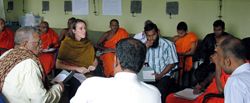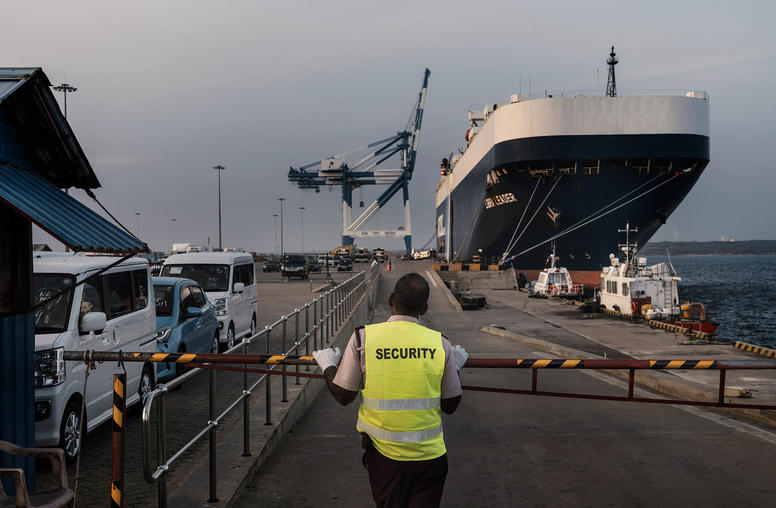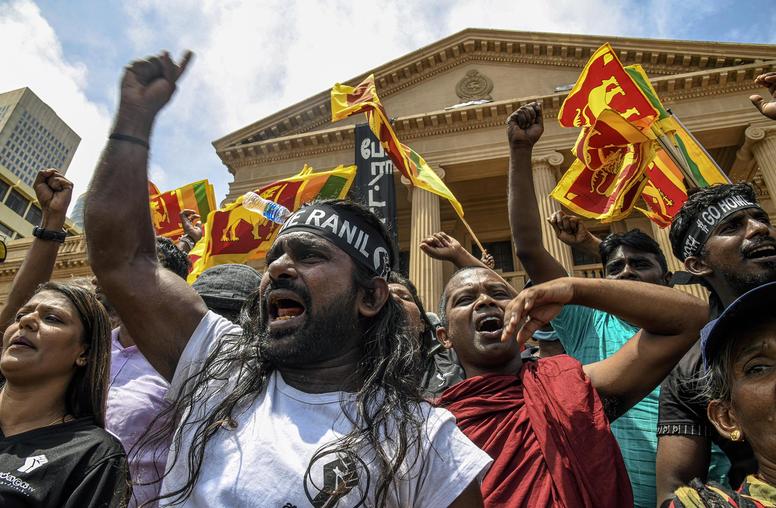USIP reports on how religious leaders are working to build peace in Sri Lanka after 26 years of civil war between the government and separatist rebels.
Overview
USIP’s Susan Hayward writes about how Sri Lanka is moving forward after a 26-year civil war between the government and separatist rebels – and the role of religious leaders in helping bring peace to the war-torn country.
 This is my first visit to Sri Lanka since the government declared defeat of the separatist group the Liberation Tigers of Tamil Eelam (LTTE) in May 2009. The LTTE and the government had been battling each other for over 26 years, the civil war marked by suicide bombings, recruitment of child soldiers, disappearances and political assassinations, and several failed peace processes. In January 2008, after having recaptured the Eastern Province from the LTTE, the government officially abrogated its 2002 Norwegian-brokered ceasefire agreement with the LTTE and pursued the group’s military defeat in earnest.
This is my first visit to Sri Lanka since the government declared defeat of the separatist group the Liberation Tigers of Tamil Eelam (LTTE) in May 2009. The LTTE and the government had been battling each other for over 26 years, the civil war marked by suicide bombings, recruitment of child soldiers, disappearances and political assassinations, and several failed peace processes. In January 2008, after having recaptured the Eastern Province from the LTTE, the government officially abrogated its 2002 Norwegian-brokered ceasefire agreement with the LTTE and pursued the group’s military defeat in earnest.
By May 2009 it had achieved its goal after pushing the LTTE into a narrow swath of land in the northeast of the island and then exterminating its senior leadership in a final bloody battle. With the fall of the LTTE leadership, so went the autocratic organization, and the Sri Lankan government were joined by many throughout the island in celebrating an end to a long war.
But challenges remained. More than 300,000 civilians, mostly Tamil, were kept in displaced peoples’/persons’ camps in the north of the country, undergoing screening processes by the government to filter out the LTTE cadres. Rumors of disappearances and horrid conditions within these camps proliferated, exacerbated by the fact that humanitarian organizations were not given full access. Under intense international pressure, and increasing domestic pressure, the government expedited its screening and resettlement process. Days after my arrival here, the government announced that it would grant the remaining displaced full freedom of movement in the coming weeks. Concerns now abound that there is not proper support provided people resettling in their former villages, many of which have been devastated by the war.
Like all post-war environments, Sri Lanka remains vulnerable to violent conflict. The root grievances of minority communities remain poignant in this new environment: still the center in Colombo controls the island’s political power, with local governance structures often disempowered and under-funded. Minority communities continue to feel that they are not an equal partner in the country’s identity and decision making. The government’s treatment of its Tamil citizens in the north in the first days following the LTTE’s defeat only seemed to confirm a sense that the government saw minorities as a threat to the State. Structural justice concerns remain. Rumors of continued disappearances and lack of accountability for human rights and humanitarian law violations fuel grievance.
These concerns have been central in the debate between the two contestants in a recently declared presidential election, to be held in January. The two main contestants are the current president, Mahinda Rajapakse, who led the country through the war, and the former army general who led the military during this time, Sarath Fonsenka. While humanitarian, corruption, governance, and human rights issues have been discussed by both candidates, little attention has been paid to a political settlement to address minority grievances.
Locally, estranged ethnic and religious communities live beside one another with suspicion, and youth sometimes take to arms against each other. For 26 years this county’s war has bred inter-communal mistrust and a sense that violence is the means to address grievance and defend one’s community. In this new brave world, many domestically and internationally call for “reconciliation” – but the term often has more meaning in theory than in practice. Now Sri Lanka’s various communities and sectors are struggling to determine how to achieve reconciliation and sustainable peace – a daunting and important task.
In this environment, I have come to meet with clergy from Sri Lanka’s four main religious communities (Buddhist, Hindu, Christian, Muslim) to discuss the role religious leadership can play in creating a peaceful and just society in Sri Lanka. These 120 clergy have been engaging with each other on an intra-religious level for over a year, developing skills in conflict analysis and finding common ground amongst disparate views within their own community. Now they are coming together for multi-religious engagement. All 120 met in early November to participate in a collective analysis of the root causes and outcomes of ethnic and religious polarization and conflict in Sri Lanka. Now they are digging in, determining how they can leverage their position as religious leaders and work together to transform the root causes fueling conflict, to rectify injustices, and to move Sri Lanka forward to sustainable peace.
Religious leaders have a particularly important role to play in post-war Sri Lanka. To begin, Sri Lanka is a deeply religious country. People identify strongly with their faith and with their religious community. But more importantly, many Sri Lankans hold deep respect for their religious leaders and look to them for moral guidance with respect to the political and social situation; this goes for those in the grassroots as well as politicians. Sri Lanka’s clergy, who in the past sometimes mobilized communities to support of the war, are thus positioned to play a significant and important role to play in helping communities repair the social fabric torn by 26 years of war. They can help address social-psychological needs in Sri Lanka, bringing healing to a deeply traumatized society and encouraging peaceful coexistence with other communities, drawing on principles from Buddhism, Hinduism, Christianity, and Islam to do so. They can also work together to mobilize public support for policy to address the root justice causes that have fueled the conflict, transforming structural injustices so that all Sri Lanka’s communities – from all ethnic, religious, and socio-economic groups -- can live in dignity and wholeness.
Given this reality, we have supported efforts to work with 120 clergy for the last year-and-a-half to strengthen their ability to serve as leaders of peace and reconciliation in their local communities. My experience these last weeks – so far I have conducted two-and-a-half workshops in a series of four – has been incredible. In these workshops, the clergy are learning skills of interfaith dialogue in order to listen to each other deeply and openly, to speak honestly and critically, to analyze how their individual and communal behaviors are living up to or falling short of their religious values and teachings, and to determine how they can work together, leveraging religious resources, to transform the root causes that have fueled conflicts in Sri Lanka. These religious leaders are earnest and engaged, desiring deeply to leverage their capacity to build reconciliation, seeking energetically to understand the perspective of the others in the room. They give me hope that there is indeed a strong desire amongst many Sri Lankans to meaningfully engage across the traditional communal conflict lines in a spirit of peace and cooperation now that the threat of violence and war has begun to recede.
The road before them is long and presents many challenges – the clergy are well aware of this – but with the deep friendships and understanding they are building as a coalition, they are making a commitment to each other that could very well lead to real impacts in time, inshallah.



